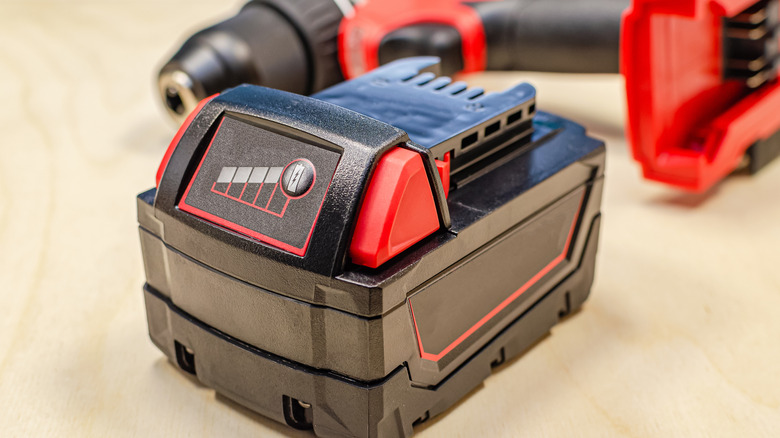The Mistake That's Secretly Shortening The Life Of Your Power Tool Batteries
Cordless, battery-powered tools are extremely convenient, allowing you to work wherever you need to without being close to an outlet. However, you could be inadvertently shortening the life of your power tool batteries, and one of the power tool accessories that every homeowner should have could be to blame. Using the wrong charger for your tool could cause your power tool batteries to die prematurely and even present a safety hazard.
Tool manufacturers may have multiple chargers for the unique needs of the different tools and batteries they make, meaning that two chargers made by one company are not necessarily the same. These designs include sensors that monitor the batteries as they charge to ensure they don't overheat and determine when the battery is fully charged. Using a charger other than the one made for a specific tool could result in an undercharged battery — or the battery could wind up overcharged, which could shorten its life or cause overheating.
If you lose your tool's charger or it stops working, it must be replaced with the specific charger recommended by the manufacturer for that tool. Universal chargers may provide some functionality, but they aren't precisely calibrated for specific batteries. Sticking with the manufacturer's charger is an easy way to extend the life of your power tools.
Best practices for preserving the life of your power tool batteries
To help preserve the life of your rechargeable batteries, don't wait until they die completely to charge them. Batteries are often hot when in use, so let your battery cool before charging, and allow it to fully charge before removing it from the charger. When it's done charging, you may want to wait about two hours before use to allow the battery to return to room temperature.
Storage areas with extreme, fluctuating temperatures or high humidity levels could shorten a battery's lifespan, so areas without air conditioning or heat may not be a good option. For this reason, your garage might not be the best place to store spare batteries or battery-powered tools. Other heat sources, such as car engines, direct sunlight, or a heating vent above the storage area could also cause trouble.
If you plan to store a battery for an extended period, it's ideal to leave it partially but not fully charged. Storing a dead battery could lead to a reduced charging capacity, while a fully charged battery stored in the wrong conditions could be at risk of developing hazardous leaks or even exploding. Before leaving charged batteries on the charger, consult the owner's manual. While some newer batteries may be left on the charger for long periods, it's possible that doing so could affect the charging capacity or cause safety issues.

